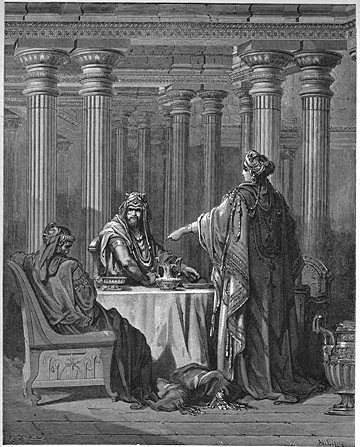Eseta 7
1 Ko ia naʻe haʻu ai ʻae tuʻi mo Hamani ki he kātoanga mo Eseta ko e tuʻi fefine.
So the king and Haman went to dine with Esther the queen,
2 Pea naʻe toe lea ʻae tuʻi kia Eseta ʻi hono ua ʻoe ʻaho ʻi he kātoanga inu uaine, “Ko e hā hoʻo kole ʻe tuʻi fefine ko Eseta? Pea ʻe tuku ia kiate koe: pea ko e hā ia ʻa hoʻo kole? Pea ʻe fai ia ʻo aʻu ki hono vahe ua ʻoe puleʻanga.”
and as they drank their wine on that second day, the king asked once more, “Queen Esther, what is your petition? It will be given to you. What is your request? Even up to half the kingdom, it will be fulfilled.”
3 Pea lea ai ʻa Eseta ko e tuʻi fefine, ʻo ne pehē, “Kapau kuo u maʻu ʻae ʻofa ʻi ho ʻao, ʻE tuʻi, pea kapau ʻoku lelei ki he tuʻi, ke foaki ʻeku moʻui kiate au ʻi heʻeku kole, mo hoku kakai ʻi heʻeku tala:
Queen Esther replied, “If I have found favor in your sight, O king, and if it pleases the king, grant me my life as my petition, and the lives of my people as my request.
4 He kuo fakatau ʻakimautolu, Ko au mo hoku kakai, ke maumauʻi, mo tāmateʻi, pea ke fakaʻauha. Pea ka ne fakatau ʻakimautolu ke hoko ko e kau tangata pōpula, mo e kau fefine pōpula, pehē, te u longo pe au, ka ko e moʻoni ʻe ʻikai mafai ʻe he fili ke totongi hono kovi ki he tuʻi.”
For my people and I have been sold out to destruction, death, and annihilation. If we had merely been sold as menservants and maidservants, I would have remained silent, because no such distress would justify burdening the king.”
5 Pea naʻe lea ai ʻae tuʻi ko ʻAhasivelo kia Eseta ko e tuʻi fefine ʻo pehē, “Ko hai ia, pea kofaʻā ia, ʻaia naʻe fielahi ʻi hono loto ke fai pehē?”
Then King Xerxes spoke up and asked Queen Esther, “Who is this, and where is the one who would devise such a scheme?”
6 Pea naʻe pehē ʻe Eseta, “Ko e tangata angatuʻu mo e fili, ko Hamani angakovi ni.” Pea naʻe toki manavahē ʻa Hamani ʻi he ʻao ʻoe tuʻi mo e tuʻi fefine.
Esther replied, “The adversary and enemy is this wicked man—Haman!” And Haman stood in terror before the king and queen.
7 Pea naʻe tuʻu hake ʻae tuʻi ʻi heʻene tuputāmaki lahi mei he kātoanga uaine, pea ʻalu kituʻa ia ki he ngoue ʻoe fale; pea naʻe tuʻu hake ʻa Hamani ke fai ʻae kole koeʻuhi ko ʻene moʻui kia Eseta ko e tuʻi fefine; he naʻe mamata ia kuo tuʻutuʻuni ʻae kovi ke hoko kiate ia mei he tuʻi.
In his fury, the king arose from drinking his wine and went to the palace garden, while Haman stayed behind to beg Queen Esther for his life, for he realized that the king was planning a terrible fate for him.
8 Pea naʻe liu mai ʻae tuʻi mei he ngoue ʻoe fale, ki he potu ʻoe kātoanga uaine: pea kuo tō ʻa Hamani ki he tokotoʻanga ʻaia naʻe ʻi ai ʻa Eseta. Pea pehē ʻe he tuʻi, “Pea ʻe tohotoho ʻe ia ʻae tuʻi fefine foki ʻi he fale ʻi hoku ʻao?” Pea ʻi he ʻalu ʻae lea mei he fofonga ʻoe tuʻi, naʻa nau ʻufiʻufi ʻae mata ʻo Hamani.
Just as the king returned from the palace garden to the banquet hall, Haman was falling on the couch where Esther was reclining. The king exclaimed, “Would he actually assault the queen while I am in the palace?” As soon as the words had left the king’s mouth, they covered Haman’s face.
9 Pea pehē ʻe Hapona ko e tauhi fale ʻe tokotaha ʻi he ʻao ʻoe tuʻi, “Vakai foki, ko e tautauʻanga, ko e hanga ʻe teau hono māʻolunga, ʻaia naʻe ngaohi ʻe Hamani moʻo Motekiai, ʻaia naʻe lea lelei maʻae tuʻi, ʻoku tuʻu ʻi he fale ʻo Hamani.” Pea pehē ai ʻe he tuʻi, “Tautau ia ki ai.”
Then Harbonah, one of the eunuchs attending the king, said: “There is a gallows fifty cubits high at Haman’s house. He had it built for Mordecai, who gave the report that saved the king.” “Hang him on it!” declared the king.
10 Ko ia naʻa nau tautau ʻa Hamani ʻi he tautauʻanga naʻa ne teuteu moʻo Motekiai. Pea naʻe toki lolou ʻae houhau ʻita ʻae tuʻi.
So they hanged Haman on the gallows he had prepared for Mordecai. Then the fury of the king subsided.





















